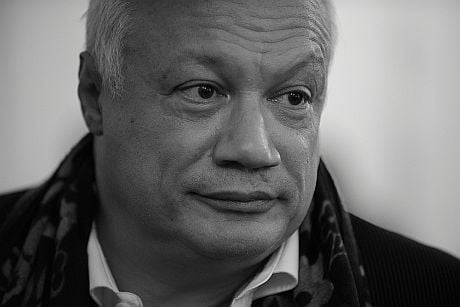
Éric-Emmanuel Schmitt
Éric-Emmanuel Schmitt was born in Sainte-Foy-lès-Lyons, France, in 1960. He studied Philosophy and Music in Lyon and at the famous École normale supérieure in Paris, and obtained his doctorate in philosophy. While still a professor at the Savoie University, he started writing plays. His first work »La Nuit de Valognes« (En.: »The night of Valognes«) appeared in 1991, followed by »Le Visiteur« (En.: »The visitor«) in 1993, for which he was awarded the Molière Theatre Prize in three categories. His best-known drama is »Variations énigmatiques« (1996; En.: »Enigma variations«, 2001), which has been performed by great actors, including Alain Delon and Mario Adorf. Schmitt has written many other plays, all of which have been staged internationally.
However, Éric-Emmanuel Schmitt is not only a playwright, but also a screenwriter for film and television, and has published numerous novels. »Le Cycle de l’invisible« (trans: The invisible cycle) deals with the great world religions. His stories focus on childhood and spirituality and have become international bestsellers, the most famous being »Monsieur Ibrahim et les fleurs du Coran« (1999; En.: »Monsieur Ibrahim and the Flowers of the Koran«, 2001), a sensitive story of a boy named Momo and the grocer, Monsieur Ibrahim. Momo is growing up without his mother and is soon to lose his father as well. He often visits Monsieur Ibrahim’s shop in the Rue Bleue in Paris. The friendly, old man takes care of the child, and teaches him the worldly wisdom he takes from the Koran. The two become friends. In 2003, the story was made a film starring Omar Sharif. »Oscar et la dame rose« (2002; En.: »Oscar and the Lady in Pink«, 2002), about a boy suffering from cancer, was also adapted for the big screen. Schmitt himself directed the filmed version of »Odette Toulemonde« (2006).
Éric-Emmanuel Schmitt is also dedicated to music and he translated Mozart’s »The Marriage of Figaro« and »Don Giovanni« into French. In his book »Ma vie avec Mozart« (2005; En.: »My life with Mozart«, 2005), a combination of an autobiography and a novel, Schmitt writes about his admiration for the composer, whom he sees as a kindred spirit. He tries to approach Mozart via a fictional correspondence with the great musician. In his novel »La part de l’autre«, 2001 (trans: The alternative hypothesis), Schmitt juxtaposes an imaginary biography and the historically true life of Adolf Hitler. Schmitt’s recent work, »La rêveuse d’Ostende« (2007; trans. Ostend’s Dreamer) deals with a man who travels to the North Sea town of Ostend, in order to forget his lost love. He moves in with the mysterious Emma, who tells him about her fantastic life and loves. Schmitt’s recent work, »La femme au miroir « (2011; tr. The Lady in the mirror) is the story of three women in three eras, who are on a quest for their selves.
In 2001 Schmitt was awarded the Grand Prix du Théâtre of the Académie Française for his life achievement. In 2010 he received the Prix Goncourt de la Nouvelle. Éric-Emmanuel Schmitt lives in Brussels.
Monsieur Ibrahim und die Blumen des Koran
Fischer Taschenbuch
Frankfurt a. M., 2004
[Ü: Annette u. Paul Bäcker]
Oskar und die Dame in Rosa
Fischer Taschenbuch
Frankfurt a. M., 2005
[Ü: Annette Bäcker, Paul Bäcker]
Mein Leben mit Mozart
Fischer Taschenbuch
Frankfurt a. M., 2008
[Ü: Inés Koebel]
Adolf H.: Zwei Leben
Fischer Taschenbuch
Frankfurt a. M., 2010
[Ü: Klaus Laabs]
Die Frau im Spiegel
S. Fischer
Frankfurt a. M., 2013
[Ü: Marlene Frucht]
www.eric-emmanuel-schmitt.com
